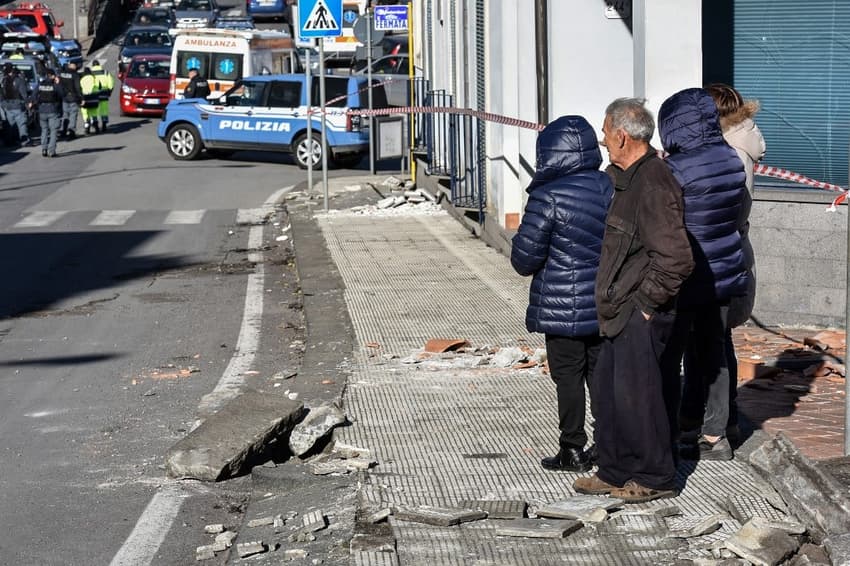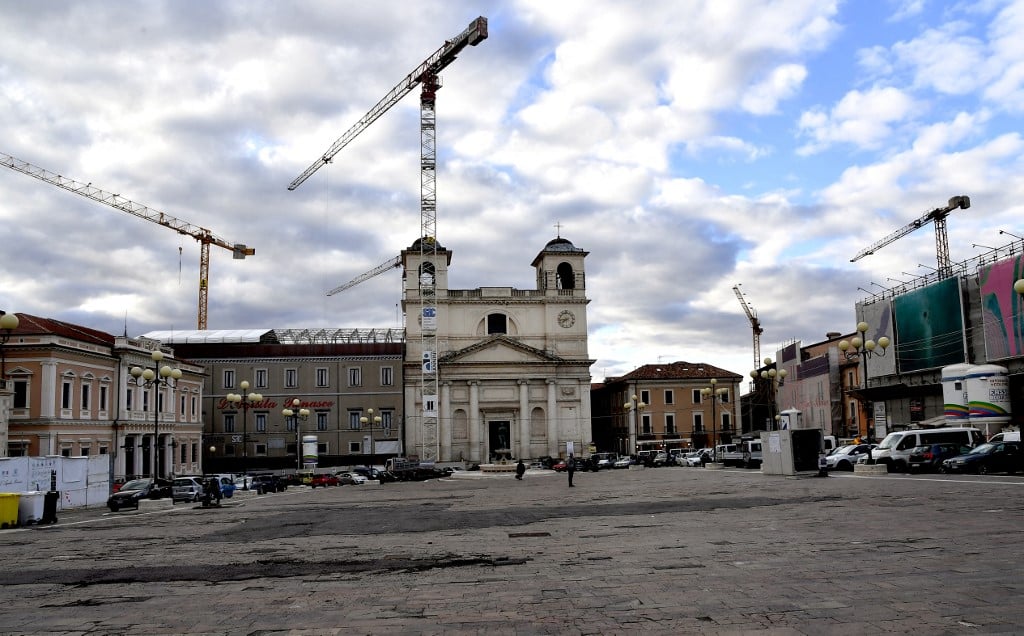What to do in an earthquake in Italy

Though the majority cause little or no damage, earthquakes are a common occurrence in Italy. Here's how to prepare and what to know about staying safe.
Earthquakes are an inescapable part of life in Italy, and if you live in the country chances are that you're in or close to an area of seismic risk.
Italy is among the European countries which experience the highest number of earthquakes, according to mapping by the European Facilities for Earthquake Hazard and Risk (EFEHR).
MAP: Which parts of Italy have the highest risk of earthquakes?
But it's important to remember that, while frequent, earthquakes in Italy are likely to be small - 4.0 magnitude or less.
Even small tremors can be unnerving however, particularly for people from countries where earthquakes are not an everyday consideration.
And, while the vast majority of the quakes and tremors felt in Italy every year cause no injury or damage, the country does occasionally suffer severe earthquakes such as the tragedies in Amatrice in 2016 and L'Aquila in 2009; events which are never far from Italians' minds whenever an earthquake is reported in the news.

The city centre of L'Aquila, central Italy, is still being rebuilt after the 2009 earthquake. (Photo by TIZIANA FABI / AFP)
If you do live in an area where earthquakes are a risk, there are steps you can take to secure your home and plan ahead to minimise any damage.
Here's the official advice from Italy's Department for Civil Protection on what you shold do before, during, and after an earthquake in Italy.
Before an earthquake:
- Find out what the seismic classification of your town or municipality is (see here and here for more information, in Italian). Depending on risk level, your local authority will have different emergency plans in place and there will be differing construction requirements for buildings, and in some cases funding available for earthquake-proofing.
- Find out where the electric, gas and water mains are located in your home and how to shut these systems off, as they could be damaged during an earthquake.
- Avoid keeping heavy items on high shelves. Secure heavier furniture to the wall.
- Keep a first aid kit, a flashlight, a battery-operated radio, and a fire extinguisher at home, and make sure that every member of the family knows where they are stored.
- Find out whether your school or workplace has a contingency plan in place and what it is.
During an earthquake
- If you are indoors, seek shelter in a doorway inserted in a load-bearing wall (the thicker ones) or under a beam, as this can protect you from possible collapses.
- Take cover under a table.
It is dangerous to be near furniture, heavy objects and glass that could fall on you.
- Don't rush to the stairs or use the elevator. Sometimes the stairs are the weakest part of the building, and the elevator can get stuck and prevent you from getting out.
- If you are driving, avoid coastal roads and do not park near bridges or beaches. They could be damaged or hit by tsunami waves.
- If you are outdoors, move away from buildings and power lines. They could collapse.
- Stay away from industrial plants and power lines. Accidents are possible.
- Stay away from lake edges and marine beaches. Tsunami waves may occur.
- Avoid using the phone (landline) and car. It is important to leave telephone lines and the roads open so as not to hinder rescue efforts.
After an earthquake
- Check on the people around you.
- Do not try to move seriously injured people.
- Go outside with caution, wearing shoes.
- Reach an open space, away from buildings and other structures.
For more information check your regional or local authority's website or see the Department for Civil Protection website here.
Comments (1)
See Also
Earthquakes are an inescapable part of life in Italy, and if you live in the country chances are that you're in or close to an area of seismic risk.
Italy is among the European countries which experience the highest number of earthquakes, according to mapping by the European Facilities for Earthquake Hazard and Risk (EFEHR).
MAP: Which parts of Italy have the highest risk of earthquakes?
But it's important to remember that, while frequent, earthquakes in Italy are likely to be small - 4.0 magnitude or less.
Even small tremors can be unnerving however, particularly for people from countries where earthquakes are not an everyday consideration.
And, while the vast majority of the quakes and tremors felt in Italy every year cause no injury or damage, the country does occasionally suffer severe earthquakes such as the tragedies in Amatrice in 2016 and L'Aquila in 2009; events which are never far from Italians' minds whenever an earthquake is reported in the news.

If you do live in an area where earthquakes are a risk, there are steps you can take to secure your home and plan ahead to minimise any damage.
Here's the official advice from Italy's Department for Civil Protection on what you shold do before, during, and after an earthquake in Italy.
Before an earthquake:
- Find out what the seismic classification of your town or municipality is (see here and here for more information, in Italian). Depending on risk level, your local authority will have different emergency plans in place and there will be differing construction requirements for buildings, and in some cases funding available for earthquake-proofing.
- Find out where the electric, gas and water mains are located in your home and how to shut these systems off, as they could be damaged during an earthquake.
- Avoid keeping heavy items on high shelves. Secure heavier furniture to the wall.
- Keep a first aid kit, a flashlight, a battery-operated radio, and a fire extinguisher at home, and make sure that every member of the family knows where they are stored.
- Find out whether your school or workplace has a contingency plan in place and what it is.
During an earthquake
- If you are indoors, seek shelter in a doorway inserted in a load-bearing wall (the thicker ones) or under a beam, as this can protect you from possible collapses.
- Take cover under a table.
It is dangerous to be near furniture, heavy objects and glass that could fall on you. - Don't rush to the stairs or use the elevator. Sometimes the stairs are the weakest part of the building, and the elevator can get stuck and prevent you from getting out.
- If you are driving, avoid coastal roads and do not park near bridges or beaches. They could be damaged or hit by tsunami waves.
- If you are outdoors, move away from buildings and power lines. They could collapse.
- Stay away from industrial plants and power lines. Accidents are possible.
- Stay away from lake edges and marine beaches. Tsunami waves may occur.
- Avoid using the phone (landline) and car. It is important to leave telephone lines and the roads open so as not to hinder rescue efforts.
After an earthquake
- Check on the people around you.
- Do not try to move seriously injured people.
- Go outside with caution, wearing shoes.
- Reach an open space, away from buildings and other structures.
For more information check your regional or local authority's website or see the Department for Civil Protection website here.
Join the conversation in our comments section below. Share your own views and experience and if you have a question or suggestion for our journalists then email us at [email protected].
Please keep comments civil, constructive and on topic – and make sure to read our terms of use before getting involved.
Please log in here to leave a comment.